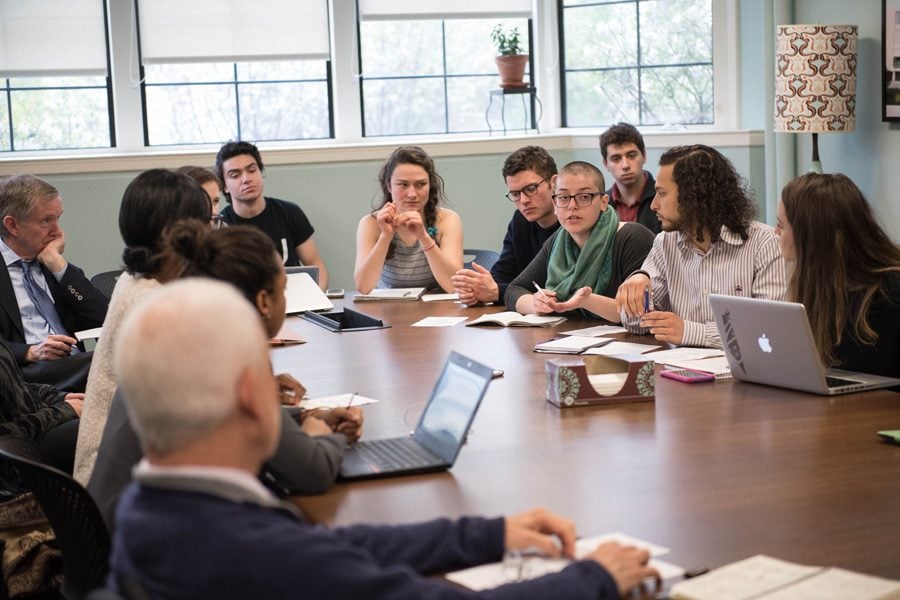Schapiro, students discuss structure of socially responsible investment committee
Leeks Lim/The Daily Northwestern
Associated Student Government president Christina Cilento (right) addresses University President Morton Schapiro and student divestment advocates. Thursday’s meeting addressed the possible structure of the socially responsible investment committee.
April 29, 2016
University President Morton Schapiro, Chief Investment Officer Will McLean and 20 divestment advocates met Thursday to discuss the charter for a socially responsible investment committee, which they will present to the Board of Trustees and its Investment Committee in June.
During the meeting, Schapiro and the students decided that the charter will detail the ways the committee will mediate between the Board, the Investment Committee and the different divestment movements. The students and Schapiro agreed that the charter should be finalized by June in time for the Investment Committee’s next meeting. This way, Schapiro said, the committee can begin to work with the Board during Fall Quarter.
“We have a rare opportunity to have a permanent, positive impact on Northwestern University and I want to do whatever we can to not squander that opportunity,” Schapiro said during the meeting.
Students of the divestment campaigns — Fossil Free Northwestern, Northwestern Divest and Unshackle NU — said they would have the charter’s first draft by May 5.
NUDivest wants the University to divest from corporations its members say violate Palestinian human rights, Fossil Free NU from fossil fuel-related companies and Unshackle NU from companies they say support the prison-industrial complex.
All three divestment campaigns advocated for the creation of the socially responsible investment campaign, which Schapiro and McLean officially announced in a March email to members of Associated Student Government and supporters of the different divestment campaigns.
With the committee of about 10 to 15 students, faculty and alumni, divestment leaders hope students will be able to make recommendations that have an effect on the Board’s investment decisions, Scott Brown, Fossil Free NU’s campaign coordinator, told The Daily.
SESP junior and ASG president Christina Cilento, a Fossil Free NU member, told The Daily that students should be allowed to elect the representatives by referendum instead of the representatives being elected in ASG’s Senate meeting.
“Given the fact that our movements are working for the liberation of people who are marginalized … I think it would be much more representative for it to be a referendum if it’s something of this weight and importance,” Cilento told The Daily.
Brown, a Medill junior and former Daily staffer, said during the meeting that one of the biggest roadblocks similar committees on other college campuses face is the lack of access to their schools’ boards. He said he wanted to prevent the committee from only having “recommending power,” meaning the committee could make suggestions to the Board, but the Board would not need to follow them.
Schapiro said he does not want students to feel disengaged from the Board’s interactions with the committee and instead would like for the Board to share feedback with the committee so the campaigns can redraft their proposals to be more effective if they were to be rejected.
Schapiro also emphasized his noninvolvement with the Board’s investment decisions. In reference to a protest held outside his house earlier this month, he said students could continue to direct protests at University administrators, but these actions have no impact on how the University invests.
“The legal responsibility of investment does not lie on the President or the Vice President of Investment — it lies on the Board,” Schapiro said. “They can ignore anybody they want.”
Although Schapiro vocally disagreed with some of the student’s points during the meeting, Cilento told The Daily she was surprised to see how supportive he was of the committee overall.
“I’m eager to see him put that support into action and know that he’s going to advocate for the things that we said today and the things that he agreed with,” she said.
Email: alfaro@u.northwestern.edu
Twitter: @marianaa_alfaro


